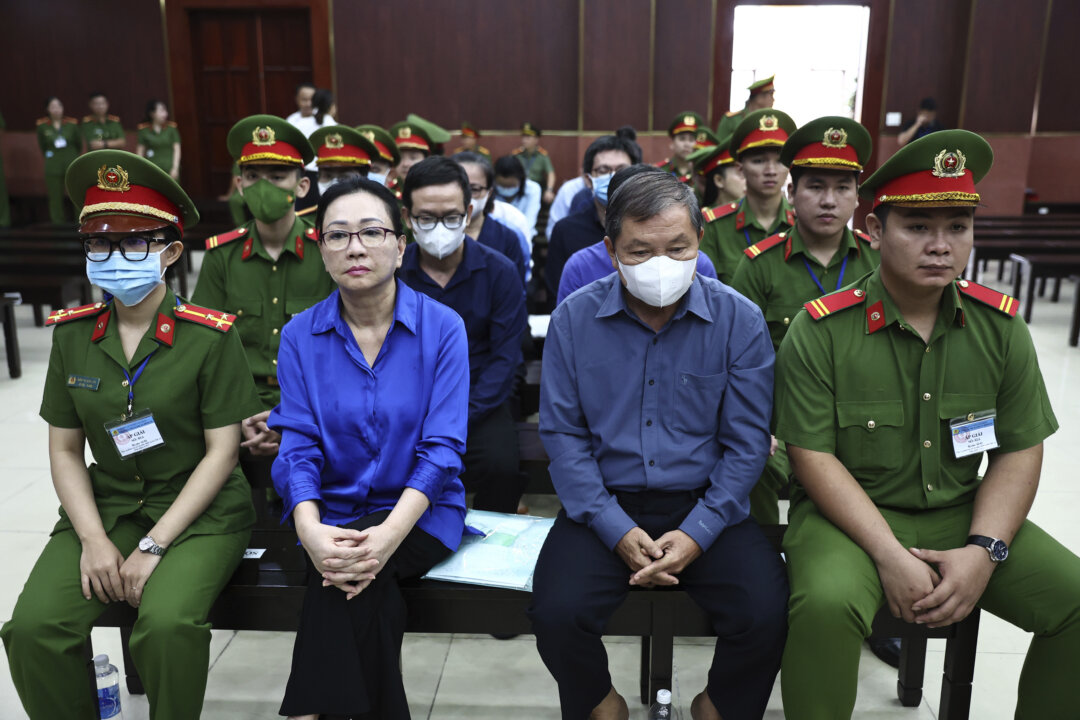Real estate tycoon Truong My Lan illegally controlled one of Vietnam’s biggest banks, the Saigon Joint Stock Commercial Bank, which almost collapsed in 2022.
A real estate tycoon in Vietnam has lost her appeal against the death sentence, which was imposed earlier this year for her role in a $12 billion bank fraud, state media reported on Tuesday.
Truong My Lan, 68, was convicted in April of embezzlement and bribery and immediately appealed.
But state media reported her appeal was rejected on Tuesday and she faces execution for a fraud totaling 318 trillion dong ($12.5 billion), equivalent to 3 percent of Vietnam’s GDP in 2022.
Lan, who chaired real estate developer Van Thinh Phat Holdings Group, illegally controlled the Saigon Joint Stock Commercial Bank (SCB) between 2012 and 2022.
‘Ghost Companies’
The bank granted 2,500 of bad loans to “ghost companies” which cost the bank 686 trillion dong ($27 billion) in losses.
It almost collapsed in 2022 and was eventually brought under state control.
The court in Ho Chi Minh City said her crimes had negatively impacted banking, caused public disorder and eroded people’s trust in financial institutions.
Vietnam.net, a state-owned media outlet, said the court rejected her appeal against the conviction but said her death sentence could be commuted to life if she reimburses 75 percent of the losses.
The BBC’s Vietnamese Service said Article 40 of Vietnam’s penal code says, “A person sentenced to death for the crime of embezzlement or bribery, who after being sentenced, has proactively returned at least three-quarters of the embezzled or bribed property and actively cooperated with the authorities in detecting, investigating, and handling the crime or has made great achievements.”
Lan’s arrest was one of the most high profile in an anti-corruption drive in Vietnam, known as Blazing Furnace, which intensified in 2022.
The Blazing Furnace campaign affected the highest ranks of Vietnamese politics but the scale of Lan’s fraud shocked the nation.
It even dampened Vietnam’s economic outlook and made foreign investors jittery at a time when the country was trying to tempt manufacturing companies away from China.
Vietnam has suffered from rampant corruption due to the lack of accountability and oversight.
Lan and her family set up Van Thinh Phat in 1992, after Vietnam allowed entrepreneurs to speculate, and draw in foreign investment.
Van Thinh Phat became one of Vietnam’s most successful real estate firms, developing luxury residential buildings, offices, hotels and shopping centers.
Orchestrated Bank Merger In 2011
In 2011 Lan orchestrated the merger of SCB with two other lenders, in coordination with Vietnam’s central bank.
But Tuesday’s court ruling said she used the SCB like a cash machine and, according to government documents, approved thousands of loans to “ghost companies.”
The court said she was behind most of these fake loans and used the money to bribe officials and cover her tracks.
According to prosecutors, at one point, over the duration of three years, Lan ordered her driver to withdraw 108 trillion dong ($4.25 billion) in cash—an amount of paper reported to weigh more than 2 tons—from the bank and store it in her basement.
The size of the indictment was so large that it had to be broken into two trials.
Lan was sentenced to life imprisonment in October at the second trial, in which she was convicted of raising $1.2 billion from 36,000 investors by issuing bonds illegally through four shell companies.
She was also found guilty of siphoning off $18 billion obtained through fraud, and for illegally transferring more than $4.5 billion in and out of Vietnam between 2012 and 2022.
Execution in Vietnam is by firing squad but figures for how many people are executed every year are hard to come by. The Death Penalty Information Center says at least 122 people were sentenced to death in Vietnam last year.
Associated Press and Reuters contributed to this report.

